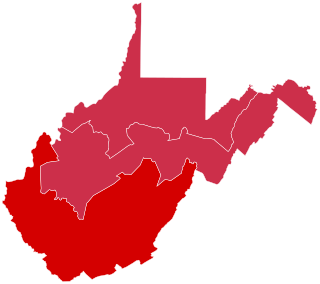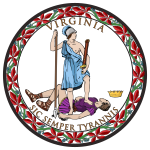
The 1954 United States Senate elections was a midterm election in the first term of Dwight D. Eisenhower's presidency. Eisenhower's Republican party lost a net of two seats to the Democratic opposition. This small change was just enough to give Democrats control of the chamber with the support of an Independent who caucused with them.

The 2000 United States House of Representatives elections on November 7, 2000 coincided with the election of George W. Bush as President of the United States. The Republican Party won 221 seats, while the Democratic Party won 212 and independents won two. Although there was minor seat change, this year was the highest percentage for the Libertarian Party in The House of Representatives and the last time that independents gained a seat.
In American politics, a conservative Democrat is a member of the Democratic Party with conservative political views, or with views that are conservative compared to the positions taken by other members of the Democratic Party. Traditionally, conservative Democrats have been elected to office from the Southern states, rural areas, the Rust Belt, and the Midwest. In 2019, the Pew Research Center found that 14% of Democratic and Democratic-leaning registered voters identify as conservative or very conservative, 38% identify as moderate, and 47% identify as liberal or very liberal.

The 2000 United States elections were held on November 7, 2000. Republican Governor George W. Bush of Texas defeated Democratic Vice President Al Gore of Tennessee in the presidential election. Republicans retained control of both houses of Congress, giving the party unified control of Congress and the presidency for the first time since the 1954 elections.

The 1982 United States House of Representatives elections in Virginia were held on November 2, 1982 to determine who will represent the Commonwealth of Virginia in the United States House of Representatives. Virginia had ten seats in the House, apportioned according to the 1980 United States Census. Representatives are elected for two-year terms.

The 1930 United States House of Representatives elections in Virginia were held on November 4, 1930 to determine who will represent the Commonwealth of Virginia in the United States House of Representatives. Virginia had ten seats in the House, apportioned according to the 1920 United States Census. Representatives are elected for two-year terms.

The 1920 United States House of Representatives elections in Virginia were held on November 2, 1920 to determine who will represent the Commonwealth of Virginia in the United States House of Representatives. Virginia had ten seats in the House, apportioned according to the 1910 United States Census. Representatives are elected for two-year terms.

The 1946 United States House of Representatives elections in Virginia were held on November 5, 1946 to determine who will represent the Commonwealth of Virginia in the United States House of Representatives. Virginia had nine seats in the House, apportioned according to the 1940 United States Census. Representatives are elected for two-year terms.

The 1948 United States House of Representatives elections in Virginia were held on November 2, 1948 to determine who will represent the Commonwealth of Virginia in the United States House of Representatives. Virginia had nine seats in the House, apportioned according to the 1940 United States Census. Representatives are elected for two-year terms.

The 1950 United States House of Representatives elections in Virginia were held on November 7, 1950 to determine who will represent the Commonwealth of Virginia in the United States House of Representatives. Virginia had nine seats in the House, apportioned according to the 1940 United States Census. Representatives are elected for two-year terms.

The 1954 United States elections were held on November 2, 1954. The election took place in the middle of Republican President Dwight D. Eisenhower's first term. In the election, the Republicans lost the Congressional majorities they had won in the previous election, due in most part to the backlash from Mccarthyism and the numerous controversies it spawned including the Army hearings and the suicide of Democratic Senator Lester C. Hunt.

The 2004 United States House of Representatives elections in Virginia were held on November 2, 2004 to determine who will represent the Commonwealth of Virginia in the United States House of Representatives. Virginia has eleven seats in the House, apportioned according to the 2000 United States Census. Representatives are elected for two-year terms.

The 1976 United States House of Representatives elections in Virginia were held on November 2, 1976 to determine who will represent the Commonwealth of Virginia in the United States House of Representatives. Virginia had ten seats in the House, apportioned according to the 1970 United States Census. Representatives are elected for two-year terms.

The 1954 United States Senate election in Virginia was held on November 2, 1954. Democratic incumbent Senator Absalom Willis Robertson defeated Independent Democrat Charles Lewis and Social Democrat Clarke Robb and was re-elected to a second term in office.

The 1940 United States House of Representatives elections in Virginia were held on November 5, 1940 to determine who will represent the Commonwealth of Virginia in the United States House of Representatives. Virginia had nine seats in the House, apportioned according to the 1930 United States Census. Representatives are elected for two-year terms.

The 1934 United States House of Representatives elections in Virginia were held on November 6, 1934 to determine who will represent the Commonwealth of Virginia in the United States House of Representatives. Virginia had nine seats in the House, apportioned according to the 1930 United States Census. Representatives are elected for two-year terms. This election was notable for the state's return to electoral district voting after briefly experimenting with electing all Representatives at-large in the previous election.

The 1926 United States House of Representatives elections in Virginia were held on November 2, 1926 to determine who will represent the Commonwealth of Virginia in the United States House of Representatives. Virginia had ten seats in the House, apportioned according to the 1920 United States Census. Representatives are elected for two-year terms.

The 2020 United States House of Representatives elections in West Virginia was held on November 3, 2020, to elect the three U.S. representatives from the state of West Virginia, one from each of the state's 3 congressional districts. The elections coincided with the 2020 U.S. presidential election, as well as other elections to the House of Representatives, elections to the United States Senate and various state and local elections.

The 2022 United States House of Representatives elections in West Virginia will be held on November 8, 2022, to elect the two U.S. representatives from the state of West Virginia, one from each of the state's two congressional districts. The elections will coincide with other elections to the House of Representatives, elections to the United States Senate and various state and local elections.






